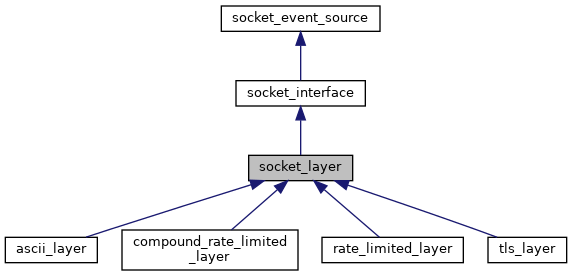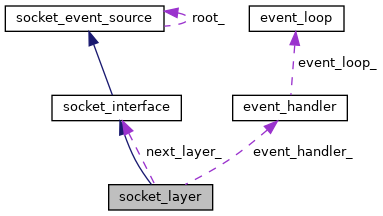 |
libfilezilla
|
 |
libfilezilla
|
A base class for socket layers. More...
#include <socket.hpp>


Public Member Functions | |
| socket_layer (event_handler *handler, socket_interface &next_layer, bool event_passthrough) | |
| socket_layer (socket_layer const &)=delete | |
| socket_layer & | operator= (socket_layer const &)=delete |
| virtual void | set_event_handler (event_handler *handler, fz::socket_event_flag retrigger_block=fz::socket_event_flag{}) override |
| The handler for any events generated (or forwarded) by this layer. | |
| virtual native_string | peer_host () const override |
| virtual int | peer_port (int &error) const override |
| socket_interface & | next () |
| The next layer further down. Usually another layer or the actual socket. | |
| virtual int | shutdown_read () override |
| Check that all layers further down also have reached EOF. More... | |
| virtual int | connect (native_string const &host, unsigned int port, address_type family=address_type::unknown) override |
| virtual int | shutdown () override |
| Signals peers that we want to close the connections. More... | |
| virtual socket_state | get_state () const override |
 Public Member Functions inherited from socket_interface Public Member Functions inherited from socket_interface | |
| socket_interface (socket_interface const &)=delete | |
| socket_interface & | operator= (socket_interface const &)=delete |
| virtual int | read (void *buffer, unsigned int size, int &error)=0 |
| virtual int | write (void const *buffer, unsigned int size, int &error)=0 |
| template<typename T , std::enable_if_t< std::is_signed_v< T >, int > = 0> | |
| int | read (void *buffer, T size, int &error) |
| template<typename T , std::enable_if_t< std::is_unsigned_v< T > &&(sizeof(T) > sizeof(unsigned int)), int > = 0> | |
| int | read (void *buffer, T size, int &error) |
| template<typename T , std::enable_if_t< std::is_signed_v< T >, int > = 0> | |
| int | write (void const *buffer, T size, int &error) |
| template<typename T , std::enable_if_t< std::is_unsigned_v< T > &&(sizeof(T) > sizeof(unsigned int)), int > = 0> | |
| int | write (void const *buffer, T size, int &error) |
 Public Member Functions inherited from socket_event_source Public Member Functions inherited from socket_event_source | |
| socket_event_source * | root () const |
| Gets the root source. More... | |
Protected Member Functions | |
| void | forward_socket_event (socket_event_source *source, socket_event_flag t, int error) |
| void | forward_hostaddress_event (socket_event_source *source, std::string const &address) |
| void | set_event_passthrough (socket_event_flag retrigger_block=socket_event_flag{}) |
 Protected Member Functions inherited from socket_interface Protected Member Functions inherited from socket_interface | |
| socket_interface (socket_event_source *root) | |
 Protected Member Functions inherited from socket_event_source Protected Member Functions inherited from socket_event_source | |
| socket_event_source (socket_event_source *root) | |
Protected Attributes | |
| event_handler * | event_handler_ {} |
| socket_interface & | next_layer_ |
| bool | event_passthrough_ {} |
 Protected Attributes inherited from socket_event_source Protected Attributes inherited from socket_event_source | |
| socket_event_source *const | root_ {} |
A base class for socket layers.
Can be used to implement layers, e.g. for TLS or rate-limiting.
Layers can in general be added on top of the next layer in any state, though individual layers may post restrictions on this.
Note instance lifetime, layers must be destroyed in reverse order.
For safe closing of a layer hierarchy, both the write and read side should be shut down first, otherwise pending data might get discarded. The shutdown and shutdown_read functions may return EAGAIN, in which case they must be called again after the next write/read event.
|
protected |
Call in a derived classes handler for fz::hostaddress_event. Results in a call to operator()(fz::event_base const&) on the event handler passed to socket_layer.
|
protected |
Call in a derived classes handler for fz::socket_event. Results in a call to operator()(fz::event_base const&) on the event handler passed to socket_layer.
|
inlineoverridevirtual |
Can be overridden to return something different, e.g. a proxy layer would return the hostname of the peer connected to through the proxy, whereas the next layer would return the address of the proxy itself.
Implements socket_interface.
|
inlineoverridevirtual |
Can be overridden to return something different, e.g. a proxy layer would return the post of the peer connected to through the proxy, whereas the next layer would return the port of the proxy itself.
Implements socket_interface.
|
protected |
A pass-through layer does not handle events itself. Instead any events sent by the next layer get sent to the event handler passed to the layer.
|
inlineoverridevirtual |
Signals peers that we want to close the connections.
Only disallows further sends, does not affect reading from the socket.
Returns 0 on success, an error code otherwise. If it returns EGAIN, shutdown is not yet complete. Call shutdown again after the next write event.
Implements socket_interface.
Reimplemented in tls_layer, compound_rate_limited_layer, and ascii_layer.
|
overridevirtual |
Check that all layers further down also have reached EOF.
Can only be called after read has returned 0, calling it earlier is undefined. shutdown_read should be called after eof to ensure all layers have reached EOF.
On an ordinary socket, this is a no-op. Some layers however may return an EOF before the next lower layer has reached its own EOF, such as the EOF of the secure channel from fz::tls_layer.
Closing the layer stack without all layers having reached EOF can lead to truncation on the write side: With a lower layer's EOF waiting in TCP's receive buffer and data pending in the send buffer, closing the socket is not graceful, it discards all pending data. Through shutdown_read you can assure that no pending data is left to receive, on this or any lower layer, so that closing the socket is done graceful ensuring delivery of all data in the send buffer (assuming there are no network errors).
Implements socket_interface.
Reimplemented in tls_layer.